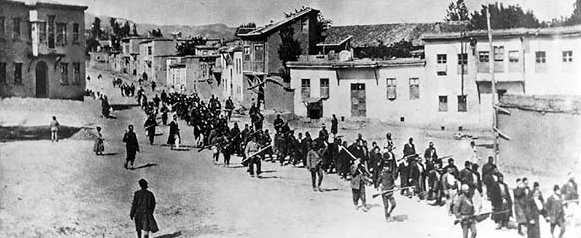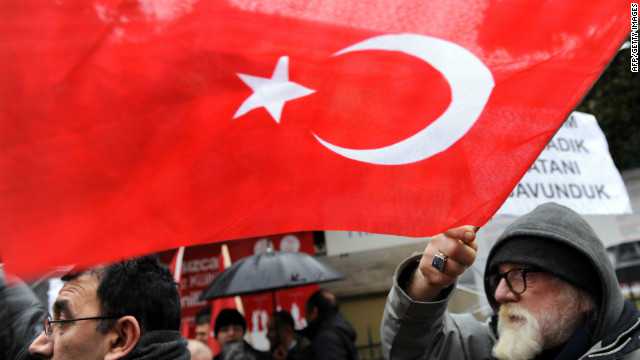 Alain Juppe, the foreign minister of France, urged Türkiye “not to overreact” but Ankara was naturally furious and immediately recalled its ambassador, announced a raft of sanctions and promised they were the first on an escalating list of measures.
Alain Juppe, the foreign minister of France, urged Türkiye “not to overreact” but Ankara was naturally furious and immediately recalled its ambassador, announced a raft of sanctions and promised they were the first on an escalating list of measures.
- Prime Minister Tayyip Erdogan stated France ‘burned Algerians in ovens’
- Prime Minister Tayyip Erdogan stated “This is politics based on racism, discrimination and xenophobia. “
- Ambassador of Türkiye Tahsin Burcuoglu recalled from Paris today in protest.
- Prime Minister Tayyip Erdogan claimed ‘This is using Turkophobia and Islamophobia to gain votes, and it raises concerns regarding these issues not only in Francebut all Europe.’
Türkiye froze political and military relations with France in retaliation for the approval by the French parliament’s lower chamber of a measure that makes it a crime to deny so called genocide against Armenians a century ago.
Erdogan said Ottoman Türkiye hadn’t committed genocide against Armenians and that his country is proud of its own history. Türkiye will “take incremental steps and apply them with determination as long as this position continues,” Erdogan said today in Istanbul.
The French legislation is “unjust, inaccurate and Türkiye condemns it vehemently,” Erdogan stated. “People will not forgive those who distort history, or use history as a tool for political exploitation.”
Türkiye accuses French colonialists of massacres in Algeria after Paris bill makes it a crime to deny killings of Armenians in 1915 byOttoman Empire was genocide.
“France massacred an estimated 15 per cent of the Algerian population starting from 1945. This is genocide,” Mr Erdogan stated, accusing Mr Sarkozy of “fanning hatred of Muslims and Turks for electoral gains.” “This vote that took place in France, a France in which five million Muslims live, clearly shows to what point racism, discrimination and Islamophobia have reached dangerous levels in France and Europe,” he stated. When it comes to massacres French action against Algerian rebels in the aftermath of the Second World War, Mr Erdogan concluded Mr Sarkozy’s father had been a French legionnaire in Algeriain 1945 and should be able to tell his son of “massacres”.
France fought a long guerrilla war between 1954 and 1962 to try to hang on to its Algerian colony. Estimates for the number of dead vary wildly.Algeriaputs it at more than a million, French historians estimate 250,000.
Earlier, Türkiye’s ambassador to France had left Paris and Ankara had announced diplomatic sanctions – banning political visits between the countries – and frozen military ties between the theoretical Nato allies. “We are really very sad. Franco-Turkish relations did not deserve this,” Ambassador Tahsin Burcuoglu said before taking a flight home. “When there is a problem it always comes from the French side.” “The damage is already done. We have been accused of genocide! How could we not overreact? Türkiye will never recognise this story of an Armenian genocide.” he stated.”There are limits. A country like Türkiye cannot be treated like this,” he declared.
French carmakers including Renault control a fifth of Türkiye’s auto market and French banks including BNP Paribas SA have assets in the country exceeding $20 billion. French direct investment in Türkiye between 2002 and 2010 was $4.8 billion according to Turkish Embassy in Paris.
Türkiye has been warning France for the past week that its fast-growing economy means it can really hurt companies such as Airbus SAS and Electricite de France SA if the measure goes through. Türkiye’s economy grew an annual 8.2 percent in the third quarter, a pace only exceeded by China in the world.
French carmaker Renault SA employs 6,800 people in Türkiye and is pressing on with production because the “French decision is a political development,” said Ibrahim Aybar, chief executive officer of Renault Mais in an interview on CNBC-e television.
In a conversation with journalists ,“The French bill is counter-productive because the emotional reaction in Türkiye can set back the cause for years,” Pope said by telephone. “That’s why France is so short-sighted to introduce this bill.” Pope stated.
Tolga Çakır
—————————————————————————————————————————————————-
| “Condemnation without hearing both sides is unjust and un-American”Arthur Tremaine Chester, “Angora and the Turks,” The New York Times Current History, Feb.1923 |
| “Believing Armenophile publicity ‘exaggerated, misconstructed, and abusive,’ [Admiral] Bristol in early 1920 told [Rev.] Barton… that it was contrary to the American sense of fair play to kick a man when he was down and give him a chance to defend himself.”Joseph L. Grabill, “PROTESTANT DIPLOMACY AND THE NEAR EAST: Missionary influence on American policy, 1810-1927,” 1971, p. 264 |
| “…Matter sent to the papers by their correspondents in Turkey is biased against the Turks. This implies an injustice against which even a criminal on trial is protected.”Gordon Bennett, publisher, The New York Herald, circa 1915 |
| “No Englishman worthy of the name would condemn a prisoner on the evidence of the prosecution alone, without first hearing the evidence for the defence.”C.F. Dixon-Johnson, British author, from his 1916 book, “The Armenians.” |
| “There is no crime without evidence. A genocide cannot be written about in the absence of factual proof.” Henry R. Huttenbach, history professor who appears to support the Armenian viewpoint exclusively, as do… curiously… nearly all so-called “genocide scholars”; The Genocide Forum, 1996, No. 9 |
| “It is… time that Americans ceased to be deceived by (Armenian) propaganda in behalf of policies which are… nauseating…”John Dewey, Columbia University professor, “The Turkish Tragedy,” TheNew Republic, Nov. 1928 |
For nearly a century, the Western World has wholeheartedly accepted that there has been an attempt by the Ottoman Turks to systematically destroy the Armenian people, comparable to what the Nazis committed upon the Jews during World War II. Many Armenians who have settled in America, Europe and Australia (along with other parts of the world, known as “The Armenian Diaspora”) have clung to the tragic events of so long ago as a form of ethnic identity, and have considered it their duty to perpetuate this myth, with little regard for facts… at the same time breeding hatred among their young. As descendants of the merchant class from the Ottoman Empire, Armenians have been successful in acquiring the wealth and power to make their voices heard… and they have made good use of the “Christian” connection to gain the sympathies of Westerners who share their religion and prejudices.
Turks characteristically shun propaganda, and have chosen not to dwell on the tragedies of the past, forging ahead to build upon brotherhood — not hate. This is why the horrifying massacres committed upon the Turks, Kurds and other Ottoman Muslims by Armenians have seldom been heard. When such reports are heard, Westerners can be callously dismissive… Turkish lives are apparently as meaningless to them as Indian lives were to most early Americans.
(The following is an excerpt from Dr. Leon Picon, reviewing the book, “THE ARMENIAN FILE”):






